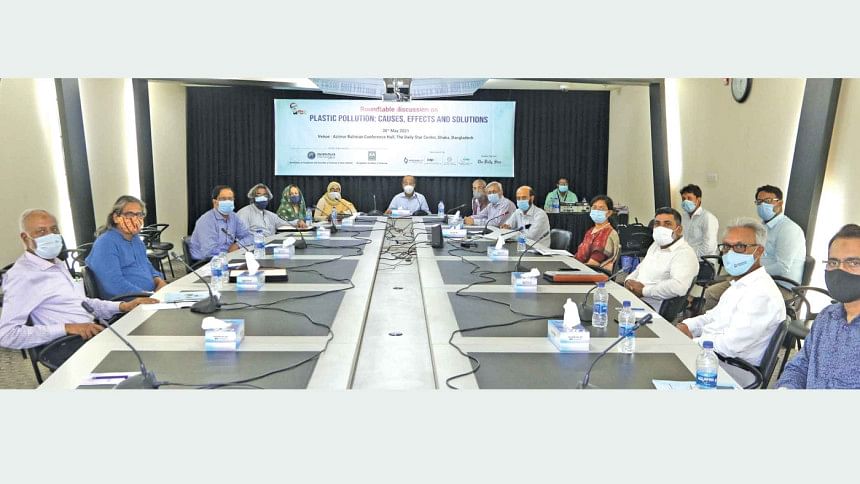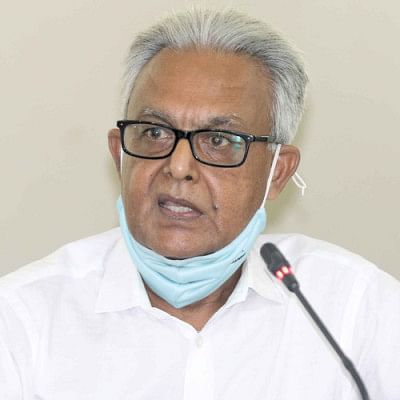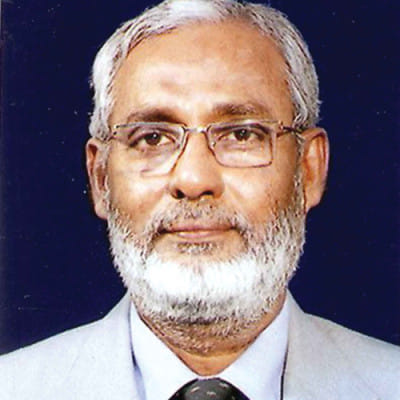Plastic Pollution: Causes, Effects and Solutions


Professor Dr Liaquat Ali, Fellow, BAS & Moderator of the session
Over the last few days, we have had multiple sessions talking about plastic pollution, and the different ways it impacts human life. Today, we will be summarising all of the important points from those sessions in this roundtable discussion. As a result of today's session, we hope that important gaps in policy will be acknowledged and amended quickly to ensure that plastic pollution can be significantly reduced.

Professor Emeritus Dr A K Azad Chowdhury, President, BAS
Today, we want to talk about the contribution of plastic towards the degradation of the environment, wastage system, drainage systems and water bodies. Millions of tonnes of plastic waste are not only destroying natural ecosystems but are also causing the decline of wildlife and biodiversity.
While in many scenarios, we don't have to encounter the problems caused by plastic pollution directly, one aspect that many people aren't aware of is our consumption of microplastics. When we eat fish, we consume microplastics, as these fishes come from our rivers and seas. The disposal of plastic ruins soil fertility and pollutes the rivers and oceans.
While discussing the problems caused by plastics with multiple experts and stakeholders of the field, a remedial measure suggested was to switch to using the golden fibre, jute, one of our country's greatest assets. We could use jute to make a polythene type of material that is biodegradable – a complete alternative to plastic bags.
Therefore, we want the government to take our recommendations, going forward, for the betterment of society and the improvement of the environment. Using our recommendation, we hope the government will strengthen academic and professional research to help curb this problem.
In our previous session, Yeafesh Osman, our honourable minister from the Ministry of Science and Technology, along with M A Mannan, the honourable minister from the Ministry of Planning, offered us their full support going forward at the policy level.
In the short term, we should be raising awareness about the issue of plastic pollution and informing consumers to adhere to the three "R"s: reducing the use of plastics, reusing and recycling plastics.

Dr M Feroze Ahmed, Fellow, BAS
If we try to understand why plastic is such a significant pollutant, then the first thing we will notice is how long plastic degradation takes. Plastic can take up to 400-500 years to decompose completely. The global production of plastics is around 400 million tonnes per year. So, taking into account both of these facts, the underlying problem becomes clear.
The second factor is pollution from the additives used in the production of plastic. We use plastic for a variety of purposes in many different products. To make these unique plastic products, producers use additives, which are highly hazardous and are slowly released into the environment throughout the life cycle of a plastic product.
When exposed to the ultraviolet rays of the sun, this plastic breaks down into microplastics or nanoplastics. This directly affects us when we consume fish from oceans that are now polluted with microplastics. Even in the commonly used plastic bottles, exposure to ultraviolet rays breaks down the plastic into the water.
Around 94 percent of tap water is contaminated with microplastics in the US, so surely the number is even higher in third world countries.
Previously, developed countries would hand over their plastic waste to developing countries for recycling, as it would significantly reduce the cost of recycling. This practice has been stopped as of 2019 because it is evident that this was unethical.
There are also ways to make plastics biodegradable using chemical modification. This biodegradable plastic needs to become more commonly adopted, as currently biodegradable plastics only account for around five percent of overall plastic production.
Chemical recycling is effective because it allows objects to be converted back to their raw materials, so no waste is produced. However, this process is much more expensive than the conventional method of producing plastics. More research could help resolve this issue. The zero-waste movement is being implemented worldwide in solid waste management, sewage treatment, and industrial waste management. But the only way to apply the same philosophy to plastics is through chemical recycling.
Incineration has been proposed for energy recovery from plastic and solid waste. However, harmful additives are released into the air when plastic is burned, which is dangerous. There are some ways to burn plastics without running into this issue. For example, the plastic could be burned at an elevated temperature, so the emitted additives are broken down into harmless molecules. But additional fuel is required to achieve this, so there is no possibility of obtaining heat energy from this process. Therefore, incineration is greatly discouraged.
Urgent recommendations:
The ban on polythene bags (with 55 micron thickness) is already there. An 'Environmental Protection Police Force' should be immediately created to enforce the ban; The curriculum of school text books should include a chapter on environmental hazards with a great emphasis on the use of jute bags for everyday shopping; Both the public and private jute mills should be greatly encouraged by the government to produce the right quantum of jute yarns for production of jute shopping bags locally by local entrepreneurs; There should be a constant reminder on BTV scrawls and those of other Private TV networks for the use jute bags. Other social media like Facebook and YouTube should also be used to inform the general public about the prudent use of plastic and the need to use jute shopping bags; The Bangladesh Academy of Sciences may be used as a think tank by the Government for tackling the problems of environmental degradation which has because a matter of life and death for us.

Professor Dr Z N Tahmida Begum, Fellow, BAS
Plastics worsen the fertility of soils and the productivity of crop plants. Micro-organisms in soil that improve agricultural fertility can't actively work if plastics block their niches (growth of plant roots), thereby decreasing crop production. Mineralisation in the soil is also disrupted. Microplastics are the most dangerous since they constantly enter our bodies through our gastrointestinal tract and cause health issues. Many new diseases are emerging due to people unknowingly consuming microplastics.
Plastic wastes in water bodies prevent phytoplankton from photosynthesis. Consequently, the food chain made up of small fish and other marine animals that depend on phytoplankton is destroyed. The productivity of the water body is ruined. All water bodies in Bangladesh lead to the Bay of Bengal, so the plastics accumulate there. Massive mammals like whales have stomachs full of plastics, so they suffocate and die. Similarly, crustaceans and ocean fishes are strangled by plastic waste and killed.

Dr Yearul Kabir, Fellow, BAS
More research is required on the kinds of diseases caused by plastic pollution. We use plastic containers when heating food in microwave ovens, causing plastic pollutants to enter our food. Plastic bottles have the same effect on water. Since the use of these plastics has increased, our body can no longer metabolise foreign plastic materials, leading to severe diseases such as cancer. Therefore, plastic component intake has to be reduced. Doing so will help relieve the social and economic burden on our health sector. In addition, the government can provide incentives to reduce the price of products made with alternative biodegradable materials, such as jute bags.

Dr Zeba Islam Seraj, Fellow, BAS
We require a sufficient amount of biodegradable alternatives. The government has to invest in biodegradables. We do not produce enough jute to replace plastics fully, which must change. Plastic disposal and collection at the source are essential. Responsible plastic usage should be encouraged in schools among students and guardians.
We need to encourage alternative products for construction materials such as tiles and certain oils that do not produce harmful fumes. Grocery shops should sell reusable bags branded with their logos so people stop using one-time-use plastic bags. Competition should be encouraged for fashionable reusable bags for grocery shopping. Using reusable bags for laundry should be made compulsory by law. Clothing stores should provide cloth bags. Fines should be implemented for grocery and clothing stores that do not offer reusable bags for their products.
Companies that produce plastic products should be held responsible by returning the plastics to them for recycling. In addition, there should be a ban on multiple types of plastic packaging materials.

Dr Tofazzal Islam, Fellow, BAS
Enzymes produced by micro-organisms react with plastics to produce nanoplastics, and plastic derived hazardous molecules. Bisphenol A (BPA) is a plastic-derived chemical compound that can bind to our endocrine system through oestrogenic receptors. These endocrine disruptors can affect humans, fishes, and many other organisms in the ecosystems. Recent literature has shown that BPA disrupts the signalling pathways of plant phytohormones. Plant roots uptake BPA, which disrupts the plant's physiology and reduces its productivity. Plastic pollution is a threat to our agricultural productivity. The agricultural revolution in Bangladesh that has pushed us towards food security has shifted its focus from the quantity of food produced to food safety. A big concern for food safety is the nanoplastics and endocrine disruptors that plants, fishes and animals readily absorb. Therefore, interdisciplinary research is required on this issue.
Biotechnology can play an important role to reduce nanoplastics. New research has found that some miracle micro-organisms have powerful enzymatic systems that can rapidly degrade plastics, microplastics, nanoplastics and plastic derived chemicals. We have damaged our terrestrial and marine environment on a large scale. Natural micro-organisms have a limited degradation capacity. We can't remediate the polluted environment with natural micro-organisms within a short period. We will require engineered micro-organisms for industrial remediation or reclamation. Besides, we should have an integrated national research project on nanoplastics and plastic derived hazardous chemicals to obtain an overall measurement and form a reclamation plan.

AB Bashiruddin Ahmed, Managing Director, Nichinta Trading Company of Bangladesh
A law was established in 2002 banning single-use plastic bags, but it has been almost 20 years now, and we couldn't eradicate plastic usage from our daily lives.
The fast-food industry has witnessed tremendous growth in previous years. It produces an excessive amount of waste each day with disposable plates, cups, straws, water bottles, etc.
The practicality of plastics makes it nearly impossible to eradicate them completely. In an ideal world, we'd have all the benefits of plastic usage with none of the harmful environmental side effects.
This dream is no longer a fantasy but a reality with advances in plastic research and technology. Today, I recommend oxo-biodegradable plastic additives, which degrade then biodegrade plastic products, including single-use plastic bags of five microns or less, into the environment efficiently and quickly. This will immediately alleviate the sewage clogging problem caused by littering. By adopting this, we can reduce plastic waste significantly in one year.
Furthermore, research and development in plastic production have produced biodegradable and compostable plastics, which reduce all harmful effects of plastic waste completely. It is 100 percent organic and takes only 60 days to fully compost into the environment leaving no harmful residue.
By adopting these modern products, we can enjoy all the benefits that plastic brings into our daily lives, and at the same time, have a strong reason to enforce the ban on harmful single-use plastics that are harming our beautiful nation.

Afjal Hossain, Executive Director, PEACE Foundation
Using existing jute fabrics, we can manufacture different types and sizes of jute bags for local and international markets.
We have the expertise and capacity to manufacture five million of these jute bags monthly using available jute fabrics.
We have huge demand from Japan, Russia, Canada and the USA for the export of different types of jute bags.
Recently Akij group assured us to provide jute fabrics and yarn as per our annual requirements. Nichinta Trading Company of Bangladesh has also assured us that they can supply oxo-biodegradable and compostable plastics out of their facilities.
As small entrepreneurs, we need financial assistance from the government and larger industries. Large industries spend a massive amount of funds each year for their branding, especially on harmful plastic products. They should be advised and directed by the government to support jute and jute handicrafts for their branding items, gift and souvenirs, which would facilitate the vast utilisation of jute goods.
Moreover, millions of animal, poultry and fish feed, fertilisers, and seeds are supplied in harmful plastics bags that should be replaced by jute bags lined with oxo-biodegradable and compostable plastics immediately. This would facilitate a considerable demand for locally produced jute.
At the same time, PEACE Foundation and NEEDS, with the cooperation of non-government organisations and the government, can train up to 50,000 entrepreneurs from all over Bangladesh.

Saifuddin Ahmed, Executive Director, Work for a Better Bangladesh
We need to modify existing laws to implement the ideas and recommendations we gathered in the last two days since our current law does not cover some aspects. We cannot change our use of plastics overnight; we need to develop a roadmap to achieve our desired goal.
Also, we must hold those who are creating this plastic waste accountable. They must be charged for the damage they are doing to our environment. Without taking such steps, the problem will never be resolved as the producers will keep producing more and more plastic. Developed countries impose a high tax on companies producing plastic, and we should do the same.

Professor Dr Haseena Khan, Fellow and Secretary, BAS
We are talking about using jute as an alternative to plastic. So we have to focus on the production of jute. The production rate is not very high, mainly because it is a seasonal plant. If we want to use jute for various purposes, we must make sure it is available throughout the year. This will require extensive research, and the government should be involved in facilitating scientists to undertake it.

Dr Mubarak Ahmad Khan, Scientific Advisor, Bangladesh Jute Mills Corporation, Ministry of Textiles and Jute
We are talking about plastic pollution. Several plastics remain intact for a long time, but the usage of single-use plastic is concerning. We can propose jute as an alternative, but it is not as handy as plastic. Every plant has a specific amount of cellulose, but jute has a higher amount of cellulose than other plants and takes 30 times less time to mature. The research has been done, but we need financial support from the government or any non-government organisation to scale up the plan.

Dr M Shamsher Ali, Fellow, BAS
The first resolution I want to mention is 'Environmental Police Force'. We have laws regarding plastic problems, but we don't have implementation. We need to ensure law enforcement through them.
The second resolution is we must introduce our future generation to the hazardous effects of using plastic bags. It will create awareness from an early age. In this regard, we should immediately include an awareness-raising campaign relating to plastic pollution into our school curriculums.

 For all latest news, follow The Daily Star's Google News channel.
For all latest news, follow The Daily Star's Google News channel. 



Comments